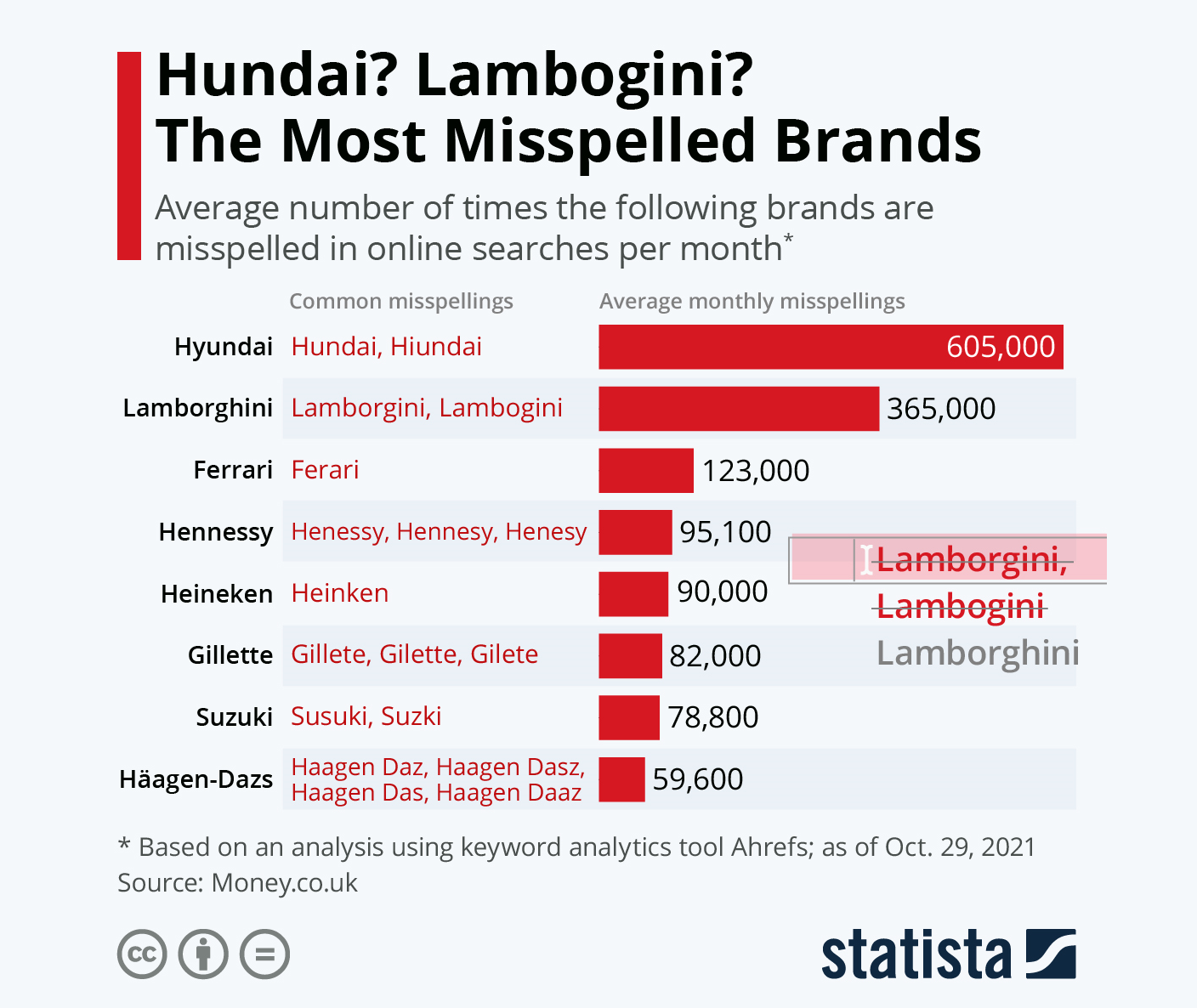A study by MoneyCO revealed some of the most misspelled names across the internet, and goes on to delve into what makes a good brand name.
Ideas come to everyone. Talk to people on the street, and one in every three or so is going to talk about this grand idea or plan that they have, some major money making scheme or business proposal that’s really going to put them on the map. They talk about plans, they talk about not having investors, they talk about aspirations. But rarely do such people have a name for their idea; a concrete statement that gets the message through. The reason is simple: choosing a name for a business is hard, and choosing a good name is even harder for many people.
One would think that a name is the first thing that businesses and start-ups come up with. They would be wrong. A good name is very difficult to brainstorm, and often takes individuals weeks, if not months. Some names are too short, some are too long. Some don’t click, they don’t deliver the message, they don’t convey the start-up’s reason for existing. Others don’t feel personal to the founders, and feel disjointed when they roll on one’s tongue. A brand name means a great deal to the creators of said brand, and therefore needs to be just right. It’s the first projection of your idea to the world, and should instantly grab their attention.
MoneyCO conducted a study on brand names that prove difficult to spell for the internet. They published a top 20 list of the brands, with the frequency of their misspellings. Using a wide variety of online statistical and analytical tools, they were able to nail down usage of the names across the internet for this study. The most misspelled name across the board ended up being Hyundai, at 605,000 instances of mistakes across a 30-day period. In fact, automobile brands make quite a few appearances on the list, with Ferrari, Porsche, Lamborghini, Volkswagen, and Bugatti being frequently found mistakes. Other examples include the ice-cream company Haagen-Dazs, and quite a few liquor brands such as Hennessey and Heineken.
Of course, these companies would be considered to have poor brand names, if they’re so prone to misspelling. Yet, the frequency at which they’re misspelled tells another story. It tells the story of names so popular, so recognizable, and so relevant that people keep buzzing about them in online conversation. The names may all be misspelled incorrectly, but their phonetics and pronunciations stick with everyone. The unfamiliarity of such names, foreign to most individuals, lends them an aura of grandiose power and authority. Lamborghini is a name that almost sounds regal. Ultimately, this is what helps these brands tough it out in oversaturated markets.
H/T: Statista.
Read next: Study Shows Which Industries Are Most And Least Trustworthy In Public Eyes
Ideas come to everyone. Talk to people on the street, and one in every three or so is going to talk about this grand idea or plan that they have, some major money making scheme or business proposal that’s really going to put them on the map. They talk about plans, they talk about not having investors, they talk about aspirations. But rarely do such people have a name for their idea; a concrete statement that gets the message through. The reason is simple: choosing a name for a business is hard, and choosing a good name is even harder for many people.
One would think that a name is the first thing that businesses and start-ups come up with. They would be wrong. A good name is very difficult to brainstorm, and often takes individuals weeks, if not months. Some names are too short, some are too long. Some don’t click, they don’t deliver the message, they don’t convey the start-up’s reason for existing. Others don’t feel personal to the founders, and feel disjointed when they roll on one’s tongue. A brand name means a great deal to the creators of said brand, and therefore needs to be just right. It’s the first projection of your idea to the world, and should instantly grab their attention.
MoneyCO conducted a study on brand names that prove difficult to spell for the internet. They published a top 20 list of the brands, with the frequency of their misspellings. Using a wide variety of online statistical and analytical tools, they were able to nail down usage of the names across the internet for this study. The most misspelled name across the board ended up being Hyundai, at 605,000 instances of mistakes across a 30-day period. In fact, automobile brands make quite a few appearances on the list, with Ferrari, Porsche, Lamborghini, Volkswagen, and Bugatti being frequently found mistakes. Other examples include the ice-cream company Haagen-Dazs, and quite a few liquor brands such as Hennessey and Heineken.
Of course, these companies would be considered to have poor brand names, if they’re so prone to misspelling. Yet, the frequency at which they’re misspelled tells another story. It tells the story of names so popular, so recognizable, and so relevant that people keep buzzing about them in online conversation. The names may all be misspelled incorrectly, but their phonetics and pronunciations stick with everyone. The unfamiliarity of such names, foreign to most individuals, lends them an aura of grandiose power and authority. Lamborghini is a name that almost sounds regal. Ultimately, this is what helps these brands tough it out in oversaturated markets.
H/T: Statista.
Read next: Study Shows Which Industries Are Most And Least Trustworthy In Public Eyes

